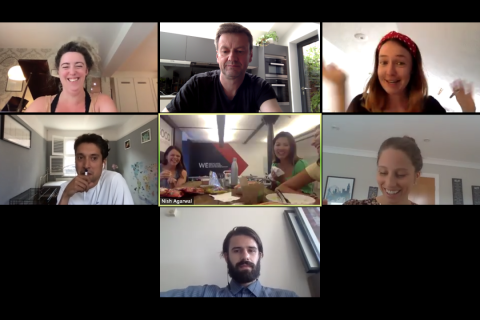
When Reni Eddo-Lodge was asked by the white host of a podcast on which she was a guest: ‘What can we do as white people to end racism?’ she responded with this:
“Well, I don’t know where you hold influence in your life. I don’t know your friends, I don’t know the extent of your jobs, I don't know where you can assess where institutional racism is really taking hold in your sector, what you as individuals can attempt to do to try and change that. I’m in no position to tell you how your lives can try and change the problem. I’ve spent many many years thinking about this, and fewer years writing about it, and I think I've done a decent job of assessing the problem. But in terms of where you hold influence in your lives? In order to attempt to overcome the problem, only you can diagnose that.”
Episode 9 of Reni Eddo-Lodge’s ‘About Race’ podcast, The Big Question, was the listening material for Good Innovation’s first Diversity & Inclusion Lunch & Debate yesterday. In response to Black Lives Matter and the murder of George Floyd, we set out to explore how individually and collectively we could affect change at Good Innovation. And we committed to better understand the issues so we could judge what a ‘good’ response looked like. Driven by the passion of the team at Good Innovation (for whom, by the way, I have such massive respect) the Lunch & Debate is one way in which we’re seeking to educate ourselves.
If you haven’t listened to Reni’s podcast, I’d encourage you to. By telling the stories of two people who have DONE something in response to the refugee crisis (which she describes as ‘one of the most urgent humanitarian failures of our time’) Reni provides an example / stimulus / food for thought about how we might respond to the injustice of racial exclusion.
Do you remember the picture of Alan Kurdi, the 3 year old refugee who drowned fleeing conflict in Syria and washed up on a Turkish beach? You might not remember where you were, but I bet you remember how you felt. Ra’ed Khan cried, and then he DID something else. He set up Road to Freedom. And has gone on to help thousands of refugees.
Gabby Edlin was volunteering at an asylum seeker drop-in centre and realised that the hygiene needs of female asylum seekers weren’t being met. So she DID something. She set up Bloody Good Period. And has gone on to help thousands of women access the products they need.
Their stories and the philosophy with which they approach their work, provided so much fodder for thought for the Lunch & Debate. So the discussion was free-flowing, expansive and inclusive. Everyone seemed to connect with different elements of what they’d heard in the podcast and had reflections about their implications - for themselves, for Good Innovation and for the charity sector.
In no particular order (because there was none), among many other things, we talked about…
Storytelling - how some audiences might be excluded from giving by (misguided?) beliefs that they don't give, and how perhaps we’re just not telling the right stories powerfully enough.
The ‘Iron Rule’ - in her podcast, Reni also speaks to Matthew Bolton at Citizens UK. He wrote a book about community organising called ‘How to Resist’ in which he describes the Iron Rule: ‘Never do for others what they can do for themselves’. That led to a conversation about...
Dignity - how both Gabby and Ra’ed were so powerful in ensuring the dignity of the people they work with, and linked to that…
Paternalism - how the charity sector is too often led by those who do not have lived experience of the issues they seek to overcome and the danger of thinking ‘we know best’ for the people we serve.
Small things - by telling Gabbi and Ra’ed’s stories, Reni wasn’t suggesting that we should all take big actions like creating new organisations - small actions count too. So we had a discussion about doing small things to effect change.
It was a brilliant, free-roaming discussion. But given one of our organisational values is to 'Make shit happen', when the discussion turned, as inevitably it must, to the ‘So what?’ we looped back to Reni’s response to the white podcast host.
What we decided to do was to ‘diagnose’ where we might have influence, both individually and collectively as Good Innovation. So where we’ll start to DO something is to understand who we could influence and how we might go about it. Just in the brief time we threw out some ideas, we came up with an impressive list - charity sector bodies, sector influencers, suppliers. I’ve no doubt there'll be many more when we do the exercise properly.
Reni quotes the Queensland Aboriginal activists group who said “If you have come here to help me, you are wasting your time. But if you have come because your liberation is bound up with mine, then let us work together.”
So we are not going to help people of colour. Instead we’ll stand in solidarity with them by influencing who and where we can in the belief that we will all benefit from greater equality and justice.
Like the white podcast host, we will get things wrong, we will make mistakes. We may on occasion say the wrong thing, ask the wrong question. But, like the white podcast host, we’ll learn our lessons and we’ll move on.
The important thing is that we DO something.